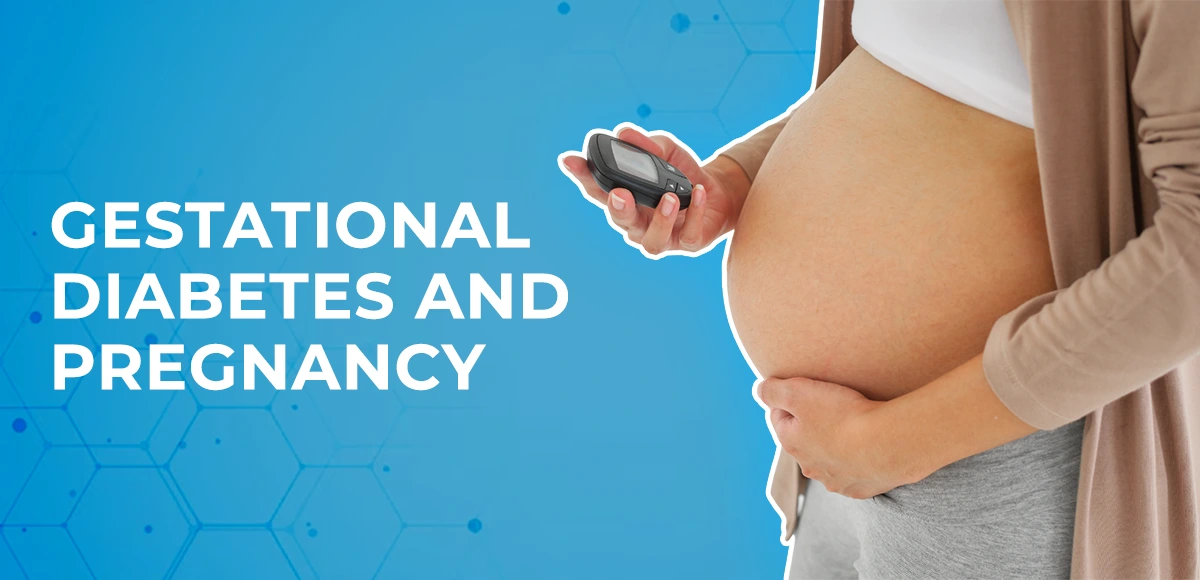In pregnancy, there is a type of diabetes called “Gestational Diabetes.” Diabetes during pregnancy can affect the health of both mothers as well as the babies. Thus it is important to take care of the blood sugar level during pregnancy.
This blog will explore its causes, tips, treatment, exercise, and more. Every pregnant lady should understand how to prevent herself and her baby from the disease.
What is Gestational Diabetes
Gestational diabetes is one kind of diabetes that occurs during the pregnancy period. High blood sugar levels can cause serious health problems for the mother as well as the baby. It can also increase the risk of type-2 diabetes.
According to Center of Disease Control and Prevention, in the United States, 2% to 10% of pregnancies are impacted by this type of diabetes.-
What Causes Gestational Diabetes in Pregnancy
The insufficient amount of insulin in your body during pregnancy can cause diabetes. In other words, it occurs when your body does not produce enough insulin during pregnancy. Insulin is a hormone made by the pancreas that permits blood sugar to enter your body’s cells for energy use.
When a woman gets pregnant, her body makes more hormones and experiences other changes, such as weight gain. Because of these changes, the body’s cells use more insulin which leads to gestational diabetes. And when Diabetes and Pregnancy comes together, it can affect the health of both mother and child in severe ways. Some times,
What are the Symptoms of Gestational Diabetes
Most of the time Gestational diabetes in pregnancy does not have noticeable symptoms. It can be mostly detected in routine screening. However, in some severe cases, gestational diabetic women may experience mild symptoms. It is advisable for pregnant ladies to go for routine tests and get Gestational diabetes test done at regular intervals.
These symptoms may include:
1. Increased Thirst and Urination:
If you are thirsty all the time during your pregnancy and are urinating more often than you may be having diabetes.
2. Fatigue:
If you are feeling unusually tired most of the time during your pregnancy, it can be a symptom of diabetes. High blood sugar levels can lower the energy levels.
3. Blurred Vision:
Fluctuations in blood sugar levels can cause blurred or impaired vision.
4. Nausea and Vomiting:
Diabetes can affect the digestive system and if you are experiencing vomiting and morning sickness it may be associated with diabetes.
5. Frequent Infections:
Gestational diabetes increases the chance of urinary tract infections (UTIs) as high sugar levels offer a favorable condition for bacterial or fungal growth.
Who is at Risk for Gestational Diabetes
Pregnant ladies can fall prey to Gestational Diabetes but some of the factors mentioned below may increase the risk of diabetes during pregnancy.
- Overweight or Obesity
- Having Pre-diabetes
- Having diabetes during a previous pregnancy
- Having Polycystic Ovary Syndrome (PCOS)
- Physical inactivity
- Baby with macrosomia in the previous pregnancy
- Mother above the age of 40
Treatments of gestational diabetes
Diabetes during pregnancy can be risky for both the mother and the child. Thus, taking proper steps to manage blood sugar levels is very important. The treatment may include lifestyle changes and in severe cases it may also require medication.
Here are some common ways to manage diabetes during pregnancy:
1. Blood Sugar Monitoring:
If you have any of the symptoms of diabetes during pregnancy, then you must check your blood sugar level regularly. You can use a blood glucose meter to get your fasting and post meal readings.
2. Healthy Eating:
To treat diabetes, a healthy diet is one of the most important things to keep in mind. Control your carbohydrate intake and distribute your meal across the day at proper intervals.
3. Regular Exercise:
Regular exercise can help you deal with your gestational diabetes. You can indulge yourself in walking, swimming, yoga and other moderate exercises. Do discuss the exercises with your doctor to ensure safety during pregnancy.
4. Medication:
In some severe cases, diabetes treatment requires medications like insulin. Insulin is one of the safest medications for managing diabetes during pregnancy.
5. Maintain your body weight:
Gaining too much weight during pregnancy can significantly increase the risk of diabetes. Being active and maintaining a proper diet can help you manage your weight even during pregnancy.
Related Health Problems
Gestational Diabetes can lead to other health problems in the baby as well as the mother. Some of the common health related problems may be:-
- High blood pressure in mother during pregnancy
- Type 2 diabetes after pregnancy
- Overweight child can be born, needing C-section delivery
- Child is prone to breathing health issues
- Child can be born with low blood sugar.
- Premature childbirth
Let’s Wrap Up
Gestational Diabetes in pregnancy can be risky for both mother and the child, maintaining a healthy diet, optimum weight, moderate physical activity help you be healthier during Diabetes and Pregnancy. Regular check-ups with your doctor and Gestational diabetes test is also important. Remember, a healthy lifestyle can prevent you from diseases and provide you a healthier and happier life.
FAQs
- Can you get rid of gestational diabetes while pregnant?
Unfortunately, you can not get rid of gestational diabetes during your pregnancy and you can’t be tested again till delivery. You can get tested within 12 weeks after childbirth.
- How can gestational diabetes be prevented?
Gestational diabetes can be prevented by eating a healthy and balanced diet and doing regular exercise.
- Can you have a healthy pregnancy with gestational diabetes?
Even with gestational diabetes, you can have a healthy pregnancy if you manage a healthy blood sugar level and follow your healthcare instructions.
- Will gestational diabetes go away after pregnancy?
As your hormonal level returns to normal after pregnancy, your sugar level will also return to normal. But in 50% of cases, women develop diabetes Type 2 later in life.

